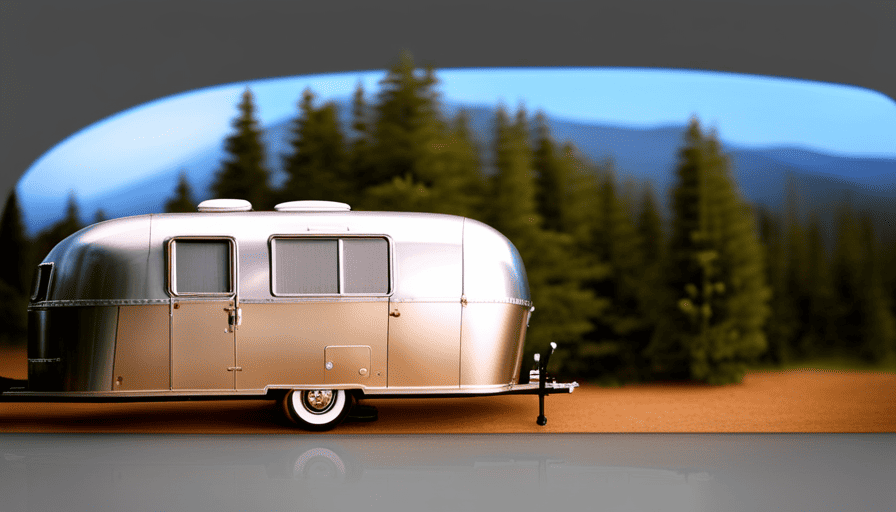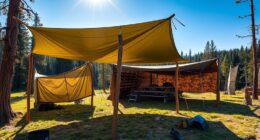Are you tired of constantly being plugged into the modern world? Do you dream of escaping the daily routine by hitting the road? If you answered yes, fellow adventurers, I have the solution for you: a camper!
But before you hit the road, there’s one important question you need to answer: how many watts do you need to power your camper?
Now, I know what you’re thinking. Who cares about watts and power consumption? Well, my friend, if you want to enjoy all the luxuries of home while on the road, you’ll need to understand your camper’s power needs. From running your fridge to keeping your gadgets charged, everything comes down to watts.
In this article, I will guide you through the intricacies of calculating your camper’s power consumption, discuss the importance of a reliable power source, and even delve into the world of solar power options.
So, buckle up and get ready to embark on the electrifying journey of camper power management. Let’s dive in!
Key Takeaways
- Understanding your camper’s power needs is essential.
- Calculating total power consumption helps determine the size of the power system needed.
- Managing power usage is crucial to avoid overloading the system.
- Solar panels offer an efficient and environmentally-friendly solution for powering your camper.
Understanding Your Camper’s Power Needs
Understanding your camper’s power needs is essential to determining how many watts you’ll need to run it smoothly. Calculating power usage and managing power usage are crucial steps in this process.
To begin, you need to understand the various appliances and devices in your camper and their power requirements. This includes items such as the refrigerator, air conditioning unit, water heater, lights, and any other electrical appliances you may have. Each of these items will have a specific wattage rating that indicates how much power they consume when in use.
To calculate the total power consumption of your camper, you’ll need to add up the wattage of all the appliances and devices that you plan to use simultaneously. This will give you an estimate of the total power usage. It’s important to note that some appliances may have a surge in power when they first start up, so you should account for this as well.
Managing power usage is also crucial to ensure that you don’t exceed the capacity of your camper’s electrical system. This means being mindful of how many appliances you run at one time and prioritizing their usage. For example, you may need to turn off the air conditioning unit while using the microwave to avoid overloading the system.
By understanding your camper’s power needs, calculating power usage, and managing power usage effectively, you can ensure a smooth and worry-free camping experience. So, let’s now move on to calculating the total power consumption and determining the necessary wattage for your camper.
Calculating the Total Power Consumption
To accurately determine the total power consumption of your camper, you need to assess and calculate the combined electrical demands of all its appliances and systems. This involves calculating the power usage of each individual device and estimating the energy requirements for the entire camper. To help you understand this process better, I have created a table that breaks down the power consumption of common camper appliances:
| Appliance | Power Consumption (Watts) | Usage (Hours/Day) | Total Power (Watt-Hours/Day) |
|---|---|---|---|
| Air Conditioner | 1500 | 4 | 6000 |
| Refrigerator | 150 | 24 | 3600 |
| Water Heater | 1000 | 1 | 1000 |
| Lights | 60 | 6 | 360 |
By adding up the total power consumption of each appliance, you can estimate the daily power usage of your camper. In this example, the total power consumption would be 10,960 watt-hours per day. This calculation will help you determine the size of the power system you need for your camper, such as the number of solar panels or the capacity of your batteries.
Considering the power requirements of appliances and electronics in your camper is crucial. In the next section, we will delve into the considerations you should keep in mind when choosing and using these devices to ensure efficient power usage.
Considerations for Appliances and Electronics
When choosing and using appliances and electronics in your camper, it’s important to consider various factors to ensure efficient power usage.
One of the key factors to consider is appliance compatibility. Not all appliances and electronics are designed to run on the same power source, so it’s crucial to check the specifications and ensure that they are compatible with the power supply in your camper. This will prevent any potential damage to your appliances and ensure optimal performance.
In addition to appliance compatibility, implementing power management techniques is also essential. These techniques can help you maximize the use of available power and extend your battery life. Some power management techniques include using energy-efficient appliances, turning off appliances when not in use, and utilizing power-saving modes on electronics. By adopting these practices, you can significantly reduce your power consumption and make the most out of the limited power supply in your camper.
Considering these factors and implementing power management techniques will not only enhance your overall camping experience but also contribute to a sustainable and eco-friendly lifestyle.
Now, let’s transition into the next section, where we will discuss the importance of a reliable power source for your camper.
The Importance of a Reliable Power Source
Don’t underestimate the significance of having a dependable power source for your camper – it’s the lifeline that keeps your adventures powered up and ready to go.
When it comes to powering your camper, there are several reliable power options to consider. One of the most common power sources is a generator. Generators provide a consistent and reliable source of electricity, allowing you to run all your appliances and electronics without any worries.
Another option is to connect your camper to shore power, which means plugging it into an external power source available at campsites or RV parks. This option provides a reliable and constant supply of electricity, ensuring that you have all the power you need during your camping trip.
Additionally, you can explore alternative power sources such as solar panels. Solar power options for campers have become increasingly popular in recent years, offering a sustainable and eco-friendly way to generate electricity. By harnessing the power of the sun, you can keep your camper running smoothly and reduce your reliance on traditional power sources.
Transitioning into the subsequent section about solar power options for campers, it’s important to consider the benefits and considerations of this alternative power source.
Solar Power Options for Campers
Consider installing solar panels on your camper – you’ll be amazed at how much money you can save on electricity bills and reduce your carbon footprint. Solar power is a great option for campers because it provides a reliable and renewable source of energy.
Here are three key factors to consider when choosing solar power options for your camper:
-
Solar panel efficiency: Look for high-efficiency solar panels to maximize the amount of energy you can generate. Higher efficiency panels can convert more sunlight into usable electricity, allowing you to power your camper more effectively.
-
Portable generator options: In addition to solar panels, you may also want to consider a portable generator as a backup power source. This can be useful during periods of low sunlight or when additional power is needed. Look for generators that are lightweight, fuel-efficient, and have enough capacity to meet your camper’s energy demands.
-
Battery capacity and management: Solar power systems often include batteries to store excess energy for use during the night or on cloudy days. It’s essential to consider the capacity of these batteries and how they are managed to ensure a consistent and reliable power supply for your camper.
When it comes to powering your camper, solar panels offer an efficient and environmentally-friendly solution. Now let’s delve into the next section about battery capacity and management.
Battery Capacity and Management
To ensure a consistent and reliable power supply for your camper, you’ll want to focus on optimizing your battery capacity and management. Battery maintenance is crucial to ensure that your camper has enough power to run all its appliances and systems efficiently.
Regularly checking the battery’s voltage and electrolyte levels, as well as cleaning the terminals and ensuring proper ventilation, are essential steps in maintaining your battery’s health.
In addition to maintenance, power storage is another important aspect to consider. The capacity of your camper’s battery should be able to meet your power requirements throughout your camping trip. It’s crucial to choose the right battery capacity based on your energy needs. This can be determined by calculating the total power consumption of your appliances and multiplying it by the estimated duration of usage.
Efficient energy usage is also key in optimizing battery capacity and management. By being mindful of your power usage and implementing energy-saving practices, you can extend your battery’s lifespan and maximize its performance. This includes using LED lights, minimizing the use of high-power appliances, and utilizing energy-efficient cooking methods.
By focusing on battery maintenance, power storage, and efficient energy usage, you can ensure that your camper has a reliable power supply throughout your camping adventures.
Efficient Energy Usage Tips
Maximize the performance of your camper’s battery by adopting energy-saving habits. Use LED lights, be mindful of high-power appliances, and embrace energy-efficient cooking methods. These simple practices can go a long way in maximizing efficiency and reducing energy waste.
-
LED lights: Replace traditional incandescent bulbs with energy-efficient LED lights. LED lights consume less power and can last much longer, ensuring that your battery lasts longer too.
-
Mindful appliance usage: Be conscious of the power consumption of your appliances. Avoid using high-power appliances unnecessarily or for extended periods. Opt for energy-efficient alternatives whenever possible.
-
Energy-efficient cooking: When cooking in your camper, choose cooking methods that require less electricity. For example, use a pressure cooker or a slow cooker instead of an electric stove. These methods not only save energy but also retain more nutrients in your food.
By incorporating these energy-saving habits into your camper lifestyle, you can maximize the efficiency of your battery and reduce energy waste. This will allow you to enjoy your camping experience without constantly worrying about running out of power.
As we delve into backup power solutions, it’s important to first establish a solid foundation of efficient energy usage.
Backup Power Solutions
Make sure you have a backup power solution in place for those moments when you need to keep your camper’s electricity flowing because, without it, you’ll be left in the dark and feeling as helpless as a fish out of water. When it comes to backup power solutions for campers, portable generators and power inverters are two popular options to consider.
Let’s take a look at these two options in a table to help you make an informed decision:
| Backup Power Solution | Portable Generators | Power Inverters |
|---|---|---|
| Pros | – Provides high power output |
- Can run multiple appliances simultaneously
- Fuel-powered for longer use | – Converts DC power from the battery to AC power
- Quieter than generators
- Can be used with solar panels for eco-friendly charging | | Cons | – Noisy
- Requires fuel
- May emit fumes
- Maintenance required | – Limited power output
- Can only run small appliances
- Relies on battery capacity
- Expensive upfront cost |
When choosing between portable generators and power inverters, consider your power needs, noise tolerance, and budget. Portable generators offer high power output but come with noise and maintenance concerns. Power inverters, on the other hand, are quieter and more eco-friendly but have limited power output.
Transitioning into the next section about safety precautions and maintenance, it is important to understand the necessary steps to ensure the longevity and proper functioning of your backup power solution.
Safety Precautions and Maintenance
Ensure the longevity and proper functioning of your backup power solution by following these safety precautions and maintenance guidelines. When dealing with power sources for your camper, it’s essential to prioritize safety.
Here are some safety tips to keep in mind:
-
Firstly, always inspect your power cords and connections for any signs of damage or wear. Replace any damaged cords immediately to prevent electrical hazards.
-
It’s also crucial to use surge protectors to safeguard your camper’s electrical system from power surges and voltage fluctuations.
-
Additionally, make sure to keep your backup power solution in a well-ventilated area to prevent overheating and potential fire hazards.
In terms of maintenance, regular inspection and cleaning are key. Create a maintenance checklist that includes tasks such as:
-
Checking the battery for corrosion and loose connections.
-
Inspecting the power inverter for any signs of damage or malfunction.
-
Cleaning the air vents to ensure proper airflow.
-
It’s also important to test your backup power system periodically to ensure it’s functioning optimally.
By following these safety precautions and maintenance guidelines, you can ensure the safe and efficient operation of your backup power solution.
In the next section, we’ll explore helpful resources for managing power in your camper without compromising on convenience and comfort.
Helpful Resources for Camper Power Management
Discover a range of helpful resources that’ll assist you in effectively managing the power needs of your camper, allowing you to relax and enjoy your adventures worry-free.
When it comes to camper power management, one essential tool is a camper power inverter. This device converts the DC power from your camper’s battery into AC power, enabling you to run household appliances and charge electronic devices. It’s important to choose an inverter that can handle the wattage requirements of your appliances.
To ensure you have enough power for your camper, it’s also worth considering portable generator options. These generators can provide additional power when needed, especially if you plan to camp in remote areas without access to electrical hookups. When selecting a portable generator, consider factors such as fuel type, noise level, and power output. It’s essential to choose a generator that’s compatible with your camper’s electrical system.
To further assist you in managing your camper’s power needs, there are numerous online resources available. Websites such as camperforums.com and rv.net offer forums where you can connect with other campers and share tips and advice on power management. Additionally, manufacturer websites often provide detailed information on the power requirements of specific camper models.
By utilizing these helpful resources and investing in the right equipment, you can ensure that your camper has the necessary power to meet your needs, allowing you to fully enjoy your camping adventures.
Frequently Asked Questions
Can I run air conditioning in my camper using solar power?
Yes, it’s possible to run air conditioning in a camper using solar power. However, it’s important to consider the air conditioning efficiency and the capacity of your solar panels. Air conditioning units require a significant amount of power, typically ranging from 1,000 to 3,500 watts.
To ensure adequate power supply, you’ll need a solar panel system with sufficient capacity to handle the load. Additionally, it’s advisable to have a battery storage system to store excess energy for use during cloudy days or at night.
What are some common power-hungry appliances that campers often overlook?
One interesting statistic to kick off is that campers often overlook the power consumption of their appliances. Power-hungry appliances like air conditioners and refrigerators can quickly drain your camper’s energy supply.
To save power, consider investing in energy-efficient appliances, such as LED lights and low-power fans. Additionally, employing power-saving tips like using solar panels or generators can help ensure you have enough energy to enjoy your camping experience without any unexpected power shortages.
How can I ensure that I don’t drain my camper’s battery too quickly?
To ensure battery longevity and effectively manage camper power usage, it’s crucial to adopt some key strategies. First, prioritize energy-efficient appliances and gadgets designed specifically for campers.
Secondly, keep an eye on power consumption by regularly monitoring voltage levels and using a battery monitor.
Additionally, limit unnecessary power usage by minimizing the use of power-hungry appliances, turning off lights when not needed, and utilizing natural lighting whenever possible.
Finally, consider investing in solar panels or a generator for alternative power sources.
Are there any safety precautions I need to take when using a generator to power my camper?
When using a generator to power a camper, it’s crucial to prioritize safety precautions. Before starting the generator, make sure it’s properly grounded and located outside and away from any enclosed or occupied spaces.
Regular generator maintenance is essential to prevent accidents and ensure optimal performance. This includes checking the fuel and oil levels, cleaning the air filters, and inspecting the exhaust system.
Following these guidelines will help keep you and your camper safe.
What are some tips for conserving energy while camping to prolong battery life?
To maximize battery life while camping, there are several tips for conserving energy. First, use LED lights instead of traditional ones, as they consume less power.
Second, minimize the use of appliances that require a high amount of energy, such as microwaves or hairdryers.
Third, unplug any devices that aren’t in use, as they can still drain power.
Lastly, consider investing in solar panels to recharge your batteries during the day.
What is the Required Number of Watts to Run a Camper?
To efficiently power a camper, understanding the required number of watts for camper electricity is crucial. This measurement indicates the amount of electrical power needed to run various appliances and devices within the camper. By calculating the total wattage of all equipment, such as lights, refrigerator, air conditioner, and electronics, one can determine the appropriate size of the camper’s power system. So, whether you’re planning a weekend getaway or an extended road trip, knowing the appropriate watts for camper electricity is essential for a hassle-free experience.
Conclusion
In conclusion, understanding the power needs of your camper is crucial for a successful and enjoyable camping experience. By calculating the total power consumption and considering the appliances and electronics you plan to use, you can ensure that you have enough watts to run your camper smoothly.
Remember, knowledge is power, and being knowledgeable about your power source options, such as solar power, efficient energy usage tips, and backup power solutions, will help you make informed decisions.
So, stay informed and enjoy your camping adventures!










